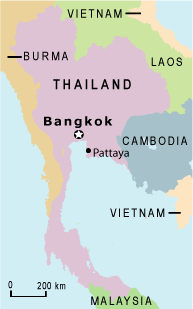A beauty contest for transvestites and transsexuals, held in Thailand on Saturday, highlighted the toleration for human differences practiced by the Rural Thai people. An AP dispatch about the Miss Tiffany Universe beauty pageant, carried by the Fort Worth Star Telegram, Boston Globe, Wilmington Star (North Carolina), Tuscaloosa News (Alabama), and numerous other media outlets worldwide, headlines how “Transvestites Glitter at Thailand Pageant.”
 The story describes the transgendered people as beautiful and smooth-skinned when they shimmied across the stage in a theater in Pattaya, a small city near Bangkok. The pageant, broadcast live on Thailand’s national television, carried a grand prize of US $2,500. Many of the contestants had delicate, feminine features according to the AP journalist, though some had to use padded bras and girdles to suggest female characteristics. The 21-year old winner, whose “delicate features could fool anyone,” only gives away her birth gender when she speaks with a male voice.
The story describes the transgendered people as beautiful and smooth-skinned when they shimmied across the stage in a theater in Pattaya, a small city near Bangkok. The pageant, broadcast live on Thailand’s national television, carried a grand prize of US $2,500. Many of the contestants had delicate, feminine features according to the AP journalist, though some had to use padded bras and girdles to suggest female characteristics. The 21-year old winner, whose “delicate features could fool anyone,” only gives away her birth gender when she speaks with a male voice.
The AP dispatch emphasizes that the Buddhism practiced in Thailand encourages people to tolerate those who are different from the majority, such as transsexuals, transvestites, and homosexuals. Many of the contestants in the annual pageant hail from the rural Thai villages—toleration of differences is not confined, in that country, to the cities or tourist areas. The contestants described their rural families as accepting of their differences so long as they became successful and did not become a financial burden to them.
According to a scholarly, social-psychological study of rural Thailand by Phillips (1965), toleration of others is one of the essential ingredients of the peacefulness of that region. Toleration prevails among the Rural Thai because of two factors: their Buddhist philosophy and their psychological outlook on the world, which they see as essentially unpredictable and uncertain. Because of these beliefs, the Rural Thai accept whatever other people do and they hesitate to define expectations of others.
Phillips does admit that part of the reason the Rural Thai accept human differences is that their own society is relatively simple. He emphasizes, however, that their undifferentiated social system only permits differences; it does not foster toleration. Many other societies that are much less complex than the Rural Thai have less toleration for nonconformity than they do. The real reason that toleration is so important to that society is that people tend to view everything as highly changeable and frail. As a result, they accept changes, differences, and nonconformity wherever they occur.
The fact that a very wide range of media outlets picked up the AP story—some even included a photo of the contestants dancing on stage in their ball gowns—may suggest that toleration for human differences is slowly gaining currency more broadly. Perhaps the growth of such a spirit of toleration will presage peacefulness in other societies as well as in Rural Thailand.